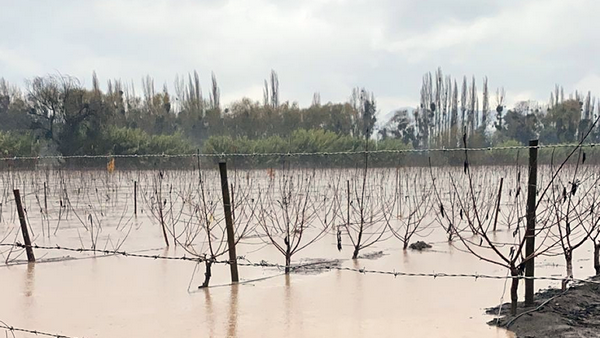The Federation of Fruit Producers of Chile (Fedefruta) and the Chilean Fruit Exporters Association (ASOEX), are both assessing the impact and damage while seeking how best to support producers and their workers affected by the floods. Both organisations expresses their solidarity with the families that have been affected and regrets the loss of human lives due to the heavy rains affecting central-southern Chile.

The two organisations issued the following separate statements:
Fedefruta statement
The Federation of Fruit Producers of Chile has received reports of damage to fruit farms and facilities due to the frontal system that is being experienced in various productive areas, whether due to flooding due to overflowing of rivers or canals, mudslides, crops complicated by excessive rain, lack of drinking water or roads cut off because of this situation.
"As Fedefruta we are probing with our regional associations and fruit producers, the impact of the heavy rains that are still continuing, but we already have reports of affectation in important fruit areas between Valparaíso and Maule," reports the president of the Federation, Jorge Valenzuela Trebilcock, a cherry producer and nurseryman in the Malloa area, affected by the rains.
However, these historical floods of the rivers should not cause the problems that are being generated, assures the leader of the fruit. “In Chile we do not have water infrastructure to avoid the collapse that we are facing, a network of medium-sized reservoirs like the one we have been proposing for years, not only to take advantage of the flows for sanitation and sustenance in the fields in times of drought, but also to contain the damage and anticipate the situations that are seen now”, adds Jorge Valenzuela, who is currently in the O'Higgins Region properties to look at the damages.
For this reason, Fedefruta has sent a survey to producers and associations linked to the activity, to measure the collapse in rural areas due to the frontal system. "We have had a development in these 20 years thinking that in Chile it would never rain and now we are in debt to respond to this situation," states Valenzuela.
Asoex statement:
"Along with regretting the situation being faced by several Chilean families in the context of the bad weather condition that is affecting the central-southern part of the country, said they are evaluating support actions, as well as the impact on water storage and irrigation infrastructure, in addition to damage in the producing areas.
"We regret the losses and difficult moments that hundreds of people are facing due to these rains. Our feelings are with all of them, especially with the people who work in the countryside and rural areas of Chile. For this reason, we are evaluating support measures in favor of the families who are having a hard time. We place ourselves at the disposal of the authorities to coordinate and focus the actions," commented Iván Marambio, ASOEX president.
"It has been many years since we have seen rains like these, generating a rise in water levels in the basins, causing rivers and streams to swell. Although the country was expecting rainfall that would allow us to face the drought, which has been affecting us for more than a decade, and thus ensure water resources for the population and productive processes, the truth is we are facing an excess of precipitation in a very short time and with inadequate infrastructure. Our reports of the accumulated rainfall between June 19 and June 25 indicate there are several areas, from Valparaíso to Los Lagos, that have received more than 100mm, highlighting Maule and Ñuble with localities with more than 200mm of rainfall," he added.
"Our first concern is the people, but we are also worried about the damage to the water accumulation and irrigation infrastructure such as canals and dams. "We have had to close the intakes and canals due to the excess flow, but not - in all cases - has it been enough to prevent the level from rising, affecting the canal and the people who live in the surrounding area," Marambio pointed out.
The Asoex president stressed the importance of working together. "The challenges imposed by climate change must be addressed by all together, communities, unions, the private industry and the public sector. ASOEX will work hard to achieve this unity and to be able to improve our water infrastructure.”
Regarding summer fruit, everything has already been harvested, and only in some very specific areas there is winter fruit such as citrus, whose harvest has been interrupted due to the weather conditions. Therefore, there would be no direct damage to the fruit, but the existence of damage to orchards due to flooding and mud, as well as effects on automatic irrigation systems and infrastructure, is being evaluated. "We will be able to better assess the impact in the course of the next few days," said Iván Marambio.
 For more information:
For more information:
Fedefruta
www.fedefruta.cl
 ASOEX
ASOEX
www.asoex.cl
